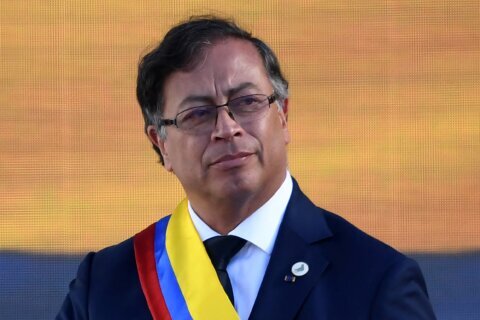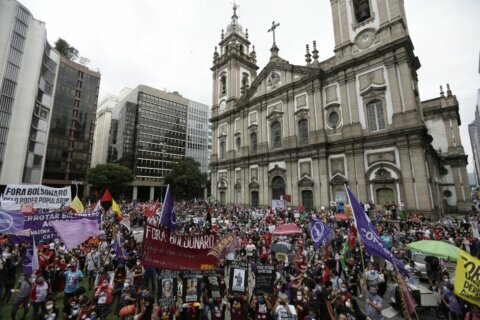GUARENAS, Venezuela (AP) — Two years ago voters in Miranda, bewildered by the decay of their once-prosperous nation, delivered a stinging defeat to the ruling socialist party by voting decisively for the opposition in parliamentary elections. But last week the state turned red again.
To Brayand Velasquez’s mind, it’s simple: While the government has provided subsidized homes and bags of food in a nation plagued by economic hardship, opposition politicians not in office or sidelined by the socialists have been mostly absent in resolving daily problems.
“They just give speeches on TV,” said Velasquez, a 30-year-old motorcycle taxi driver in the poor, gritty mountainside city of Guarenas.
Opposition leaders have disputed the surprise result of last Sunday’s elections, in which official election returns show government-backed candidates took 18 of the country’s 23 governorships. But one evident takeaway is that the socialist movement founded by the late President Hugo Chavez can still pull large numbers of voters to the polls.
If the data from the government-friendly National Electoral Council is correct, the opposition received nearly 3 million fewer votes than in 2015, while the ruling party largely maintained the more than 5 million votes it captured two years ago.
Not all that stems from ideological conviction. Some voted for the ruling party out of fear of losing a government job, others not wanting to miss out on a chance to live in one of thousands of new homes President Nicolas Maduro’s government is building for low-income families.
But the turnout for Maduro allies suggests that despite the president’s low approval ratings, crippling inflation and shortages of basic goods, many Venezuelans would still rather cast their ballot for the socialists than for the opposition.
“‘Chavismo’ is still alive,” said David Smilde, a Tulane University professor and expert on Venezuela, using the Spanish word for followers of Chavez’s movement.
Socialist leaders are hoping the unexpected win will boost support going into next year’s presidential election. And there are other factors favoring Chavez’s so-called Bolivarian movement: Deep fractures remain within the opposition camp; emigration by Venezuelans fed up with life under Maduro continues; and low crude prices are forecast to rise in 2018, which could ease the fiscal crisis for this heavily oil-dependent state.
“This election marks a Bolivarian rebirth,” said a triumphant Delcy Rodriguez, a Maduro loyalist and president of a newly installed constitutional assembly that has essentially unchecked powers.
Guarenas, which is home to about 200,000 people east of the nation’s capital, Caracas, is in many ways emblematic of how the government won on Sunday.
Designed as a bedroom community for working- and middle-class families, the city is known as the origin of violent 1989 protests known as the “Caracazo,” which spilled into the capital, left more than 300 people dead and destabilized the government.
After long voting reliably with the socialists, Guarenas went with the opposition two years ago as Venezuela’s crisis deepened. And with long lines still forming daily outside nearly empty supermarkets, polls had favored opposition candidate Carlos Ocariz to win handily Sunday.
But Ocariz garnered just 37,000 votes in Guarenas compared with 57,000 that went for the opposition in 2015. His opponent, Hector Rodriguez, won in the city with nearly 51,000 votes.
A similar trend played out on a statewide level and across much of the nation as opposition candidates were hurt by high abstention rates in their strongholds.
Observers have attributed that to a combination of disillusionment among opposition supporters, contradictory messages from their leaders on whether to vote at all and an overall lack of faith in the country’s electoral system and the possibility of change.
The National Electoral Council’s last-minute decision to relocate dozens of polling places, affecting more than 200,000 voters in Miranda, also may have discouraged opposition voters. Some were moved to sites in rough neighborhoods where groups of armed, pro-government civilians were visibly present.
“There were some people who were driven enough to change the political situation that they risked their lives,” said Yoger Mendez, who volunteered at one of the relocated centers. “But others did not.”
Most polls show no more than 30 percent of Venezuelans identify as “chavista” today, down at least 10 points since Chavez’s death in 2013. Maduro’s own approval rating has dipped as low as 17 percent — a relatively solid number given the country’s dire state, and in the same ballpark as or even better than several Latin American presidents overseeing far healthier economies.
Nicmer Evans, a left-leaning political analyst who is also critical of the government, estimates about half the socialist party vote is the product of coercion while the rest stems from true political conviction.
“The government knows it has profound limitations,” Evans said. “But they also know how to consolidate what they have.”
Opposition leaders so far have presented what they say is evidence of ballot box tampering only in the eastern state of Bolivar. In Miranda and other states, they are pointing to maneuvers such as the voting center relocations and arguing that they depressed opposition turnout. They also accuse the government of using its resources to buoy socialist party candidates, including bringing bags of subsidized food to campaign events and voting centers.
“They won by buying the will of the people,” said Eliezer Sirit, an opposition candidate who lost in Falcon state, “taking advantage of the hunger they themselves created.”
Velasquez, the moto taxi driver in Guarenas, was critical of Miranda’s exiting governor, Henrique Capriles, one of Venezuela’s best known opposition leaders who nearly beat Maduro for the presidency in 2013.
“They called him the ghost governor because he was never around,” Velazquez said. In contrast, he said, he liked the frank way Rodriguez, the socialist candidate, discussed Miranda’s problems and how he planned to solve them.
“He did something important,” Velasquez said. “He listened to the community.”
___
Associated Press writer Fabiola Sanchez reported from Guarenas, and Christine Armario reported from Bogota, Colombia.
Copyright © 2026 The Associated Press. All rights reserved. This material may not be published, broadcast, written or redistributed.







